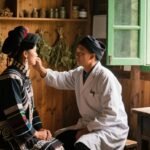Dr. Guo Hexuan (given name Changnian), a rural physician in China, specialized in prescribing herbal medicines. One summer, he suddenly developed severe eye pain. Believing it was due to “heat” (a common TCM diagnosis), he self-prescribed cooling herbs like Coptis (Huanglian), Gardenia (Shanzhi), chrysanthemum, and mint. Surprisingly, his condition worsened. Eventually, he sought my help.
Upon examination:
No redness, swelling, or visual obstruction
A tiny red spot on the iris
Pulse: deep, rapid, but weak
Diagnosis:
This indicated yin deficiency (insufficient bodily fluids) combined with metabolic stagnation in the liver. Cooling herbs had suppressed his body’s self-regulation, akin to adding ice to an overheated pan—only intensifying the problem.
Treatment:
Modified the classical formula Qiju Dihuang Tang (Lycium-Chrysanthemum Rehmannia Decoction) by replacing prepared rehmannia (Shu Dihuang) with raw rehmannia (Sheng Dihuang) to better nourish yin.
Results:
Pain reduced after one dose
Red spot vanished within three doses
Key Explanations for Global Readers:
Eye Conditions in TCM Categories
External: Heatstroke-like cases with sudden swelling (treated with herbal washes)
Internal Excess Heat: Linked to digestive issues (e.g., dizziness + thirst, treated with (supports liver function) herbs)
Internal Deficiency Heat: Guo’s case—subtle symptoms rooted in yin-fluid depletion
Core TCM Principles Applied
“Yin deficiency generates internal heat” (Yellow Emperor’s Canon)
“Liver (Wood) and Kidney (Water) interdependency” (organ systems interaction theory)
“Nourish water to control excessive fire” (balance through yin supplementation)
Dr. Guo finally grasped the nuance: suppressing symptoms ≠ treating root causes. Persistent misuse of cooling herbs might have led to chronic vision impairment. He expressed deep gratitude for this paradigm shift.

Glossary:
Yin fluids: Moistening, cooling bodily substances in TCM
Deficiency heat: Heat symptoms arising from bodily resource depletion, not infection
Rehmannia: A root herb used to tonify yin (raw vs. prepared versions have distinct effects)
The esteemed medical text Zui Hua Chuang Medical (Original: Ming Dynasty Clinical Archives) has been translated by timtcm.com. We welcome your valuable comments and feedback in the section below.


Leave a Reply